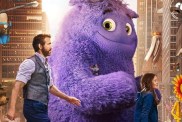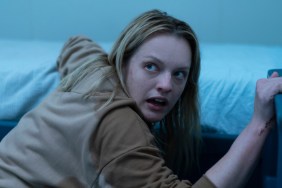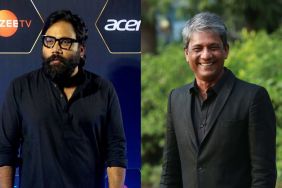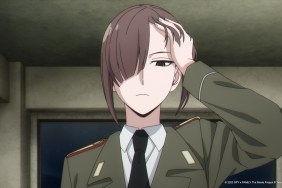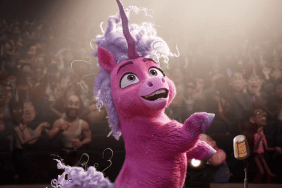Director talks sequel from the mixing studio

When the undead rear their dusty, beef jerky’d bodies to spearhead an effort to take over the world, you call the O’Connell family. As a matter of fact, don’t bother. They’ll somehow, inevitably, find their way into some form of high adventure with guns a-blazin’ and a rampaging mummy or two, whether they mean to or not. Two very popular films have taught us that. The first, Stephen Sommers’ rewriting of Mummy history in Universal’s 1999 blockbuster hit; then in 2001’s manic, CGI-festooned The Mummy Returns which found Rick and Evelyn O’Connell (Brendan Fraser and Rachel Weisz, respectively) strapped with Egypt-trotting spawn of their own, Alex, to aid them in their defense against a mummy who wouldn’t stay down.
Seven years later, Imhotep’s ancient news.
Universal now welcomes a new director and a, for lack of a better word, fresh mummy menace in The Mummy: Tomb of the Dragon Emperor. Fraser is back but his loved ones have changed appearances this time. A History of Violence‘s Maria Bello now plays Evelyn and Luke Ford is Alex O’Connell – older and carrying on his own career as an archeologist. And lest we forget John Hannah reprising his role as Jonathan, Evelyn’s often-sauced brother. They face big trouble in China when the titular Emperor Han (Jet Li) – a tad peeved from being baked alive with his army long, long ago – is resurrected by a General to wreak havoc.
Written by Alfred Gough and Miles Millar, the story uses the real life discovery of a buried terracotta army near Xi’an in 1974 as a leaping off point to establish a new mummy mythology far removed from the sands of Egypt. Against this backdrop of action, horror, monsters and a smattering of kung-fu (provided by Li and co-star Michelle Yeoh), the O’Connells sort out personal and martial issues that come with age (’cause nothing says family time like a mummy attack).
Director Rob Cohen is at Todd-AO Studios today burning the wick at both ends. In his company are sound engineers Gary Summers, Scott Millan, and Daniel Leahy. All are hustling to cram over a month’s worth of work into three weeks. On the to-do list: Re-sync and conform select tracks after making adjustments to reel 2 and sweeten the audio. Earlier this afternoon, Cohen was in another part of Santa Monica supervising a few of the overwhelming amount of The Mummy‘s CGI effects. He’s been moving at a breakneck speed since shooting began on the third chapter in July of 2007. Yet Cohen’s endurance shows no signs of wear; his nature is positive and when he’s asked by his assistant what change of clothes he should have set aside for Cohen, the director responds with an easy, “Jeans and a t-shirt.” Casual is one way to describe this director sitting before us in ripped jeans and a stack of Buddhist mala beads on his right wrist.
During ShockTillYouDrop.com’s visit to the studio, Cohen shows us a few select scenes which includes Rick and Evelyn being pulled out of retirement for one last mission (promising possible danger – this, of course, peaks the couple’s interest), Alex discovering the tomb of Emperor Han (booby-traps galore, lotsa dead guys and the introduction of the very stunning Isabella Leong) and a skirmish at “Imhotep’s,” a Shanghai nightclub owned by Jonathan, naturally. How does it all look? Well, it’s definitely Mummy business as usual with the mixture of action and laughs. A few things Cohen and company has done right is making Alex older; he’s got his father’s instinct and charisma (his skirt-chasing skills are lacking, as we see) – a fitting successor to carry on future films, if called upon to do so. A new setting appears to be a sure-fire way to revitalize the franchise as well.
Shock talks to Cohen in-depth about the making of the film, the intentions he set out to uphold and why a certain cast member chose not to return.

ShockTillYouDrop.com: This is a fully aware Mummy film it looks like. Evelyn has written two books, The Mummy and The Mummy Returns, you’ve got the Imhotep nightclub…
Rob Cohen: You have to be. You have to know the filmmaker knows what kind of movie he is making and what his audience is. We have just enough of a wink at the past so we can launch into the future in a whole different tone which this movie does do.
Shock: You’re also facing quite a challenge because not only do you need to meet certain expectations with a third chapter, but you’re starting from scratch by dispensing with the Imhotep mythology. Essentially, you’re putting your own mark on it now.
Cohen: When they sent me the script, I had lived in China in my past when I did Dragon: The Bruce Lee Story, I have a home in Indonesia, I’m through Asia all of the time. I’m a practicing Buddhist. I just have a love for all of this. And I said to them, if you want a treatment of China where the Chinese are kind of funny, I’m not you’re guy. I’m going to do a movie that follows a true love of Chinese culture. So, Stephen Sommers, Sean Daniel and Jim Jacks – the producers – wanted me to make my movie. The studio was 100% supportive of that. A reporter recently said to me that the new Indiana Jones film went toward the direction of the Mummy franchise. That’s funny, because I’ve gone more towards the direction of Indiana Jones.
Shock: Many films of this ilk that have a worldly scope tend to rely on creating digital environments – what real-to-CG ratio would you say you have in this film? Did you shoot mostly on location/set?
Cohen: 100% sets. There are no green screen sets in this movie. I went all over China – the deserts of Beijing. [The scene you’re watching] is a 300-year-old Ming opera house that the red guards tried to destroy. There are these beautiful murals in there. They painted the thing white and one of the things I loved [about this location] is the murals are bleeding through the white, they’re coming back from the defacement.
Shock: Was it hard to sell the studio on going to China? Did they ever say you could just do this in Burbank?
Cohen: The truth is, I had a list of ten commandments when I went in for the first meeting. One of them was that we were going to shoot all location stuff in China. We went to Western China near the Kazakhstan border then down to Hengdian then we wound up at the Shanghai studios where we had a basic standing set of The Bund, then we expanded it for this chase featuring a chariot drawn by four bronze horses.
Shock: What were your other commandments?
Cohen: The respect for the historical context. Jet Li was a big one. All I wanted back was Brendan [Fraser] and John [Hannah]. If Rachel [Weisz] came back it was all right, but if she didn’t come back it was all right. There would be no bad cultural jokes goofing on the Chinese or the Chinese culture – which was in the script when I got it. I was going to do a battle sequence in the end that wasn’t in the script in which it would be Jet Li bringing the terracotta army back to life, but still terracotta. Michelle Yeoh and Maria [Bello] would bring back all of the people who died in the foundation building the Great Wall of China. ‘Cause this Emperor started the great Northern Wall project and anyone who was his enemy, or any conquered soldier…they were worked to death building the wall. They found [the remnants of] a guy who was a lawyer of the time, they found him with the scrolls of 27 volumes of legal cases of the time and the punishment for almost anything – other than being cut in half, or beheaded, or drawn and quartered…it just said “wall.”
Shock: Where is O’Connell family at this stage in their lives when this film picks up?
Cohen: Alex is now 21. Rick and Evie have retired and they’re just bored out of their minds. They’ve got no juice between them. They hardly have anything to say. He’s trying to learn how to fly fish, she’s a novelist who’s written about the two experiences she’s had and doesn’t know where to go with a third one. They’re dried up until the foreign office gives them an assignment to courier back a precious Chinese artifact back to Shanghai. They don’t know that they’re son is in China and they don’t know that he’s found the tomb until they get there. At that point, instead of embracing him, they’re mad at him that he dropped out of college, they’re treating him like he’s ten and he fights back. You’ve got Luke Ford versus Brendan in a contest of wills that every father and every son knows. That goes on through the whole film. The rekindling of the Rick/Evie romance and the final acknowledgement of son to father and father to son is really a big part of the movie. There’s a really nice family dynamic within the big story.

Shock: Indiana Jones recently introduced his son – how is the play between Brendan and Luke going to be different than the Jones family?
Cohen: First of all, the son is not a caricature. [Alex is] a real identifiable kid who found a diary in the stacks and got [his expedition] financed and found the tomb. Steven was making a very extreme character out of Shia [LaBeouf]. Whenever you bring someone in on a Harley doing Marlon Brando, you’re not taking off on this level. I think the rapprochement here is totally emotional. It’s a very different intent. It’s ironic because I did see [Kingdom of the Crystal Skull] and there are similarities. But we didn’t know what they were doing at the time. I think you’ll see our treatment is different in tone and casting. Luke is 6-foot-3, an inch and a half taller than Brendan. And Brendan is great in this, because he’s anchored with real stuff, his humor is so much funnier. Because when he does be funny, he’s genuinely funny. He can be exasperating and frustrated.
Shock: On the flipside, this film has a large menagerie of monsters: The dragon, the Yeti, the Foo dogs – were these some of your concoctions or were they originally introduced in the script?
Cohen: The Yeti was in the script. The three-headed dragon was not, nor was the Foo dog, but I had been developing Sinbad with Keanu Reeves and I had become interested in the character that was going to be Jet – the villain in that was going to be a shape-shifter. So, I put it in here. Once he reaches the pool of eternal life at Shangri-La, he could now change form when he needed to. When he gets back to raise the army, he turns himself into a three-headed dragon so he could fly out of the Himalayas, not hike. Then he turns himself into the temple guardian dogs and can just cross the battlefield. You get the opportunity in a movie like this that you can’t do in Indiana Jones because in Jones when it got more slapstick, it still had to be in the world. This is a magical world and when you start talking about the undead, you may as well go all the way. Take your opportunities and make it something unforgettable.
Shock: How did you take to the visual effects workload you laid out for yourself?
Cohen: My first effects film was Dragonheart. In those days there was no Pixar, but to do a photo-real creature that spoke and had the personality of Sean Connery in 1994 was a big leap. ILM and I really conquered it, I think. Daylight had a lot of effects. Then I put a lot of effects in Fast and Furious in a more limited type, XXX had it with an avalanche sequence. Stealth was a major effects movie, then this one is the most major thing that I’ve done. This is has 1,000 visual effect with the most complicated 3-D work that you could possibly do. We had to write all new algorithms for the liquid solids, as I called them, to make the terracotta to move and not make it look like latex. It was a challenge.
Shock: Where has Stephen Sommers been in all of this? He’s a producer and you mentioned he gave you creative freedom, but has he popped in to check up on your progress?
Cohen: I’ve seen Sommers four times in a year in a half. I saw him in the first meeting, at the table read in Montreal where he heard the actors, I saw him when I finished my cut and I saw him last week.

Shock: Sounds like a definite passing of the torch then.
Cohen: It’s the right thing to do because trying to wrangle a guy like me is not the right thing to do. But he had the respect from one director to another. He’s a really good guy and he realizes, “I’m giving it to you, because I could’ve done it but I’m doing something else now. So I’m going to trust you.” Not many guys could do that. I’ve watched all of my franchises trashed out of existence by guys like Neal Moritz, the producer. It hurts. It hurts when you see something like Fast and the Furious or XXX and you see what they do. It’s very disappointing.
Shock: Of the existing Mummy films, everyone has their favorites…
Cohen: I like the first. Because, in one, I felt something very genuine evolving. I felt it was fresh, that there was imagery in there that was unforgettable, it was having a good time with it but it carried a certain discipline. I felt the second one became a lot of overkill. It wasn’t as successful, but it was more financially successful. The studio did a lot of research about the fans and the audiences – the thing they found was most were in favor of number one, but what they remembered was: Brendan Fraser, great visual effects, and a sense of fun. I took that to heart. Although my sense of humor is different than Stephen’s, this movie is an enjoyable movie to participate in. It’s a fun ride.
Shock: Do you see yourself doing another Mummy, returning to this mythology?
Cohen: I don’t know about this mythology, but I had such a good time with this cast, Brendan and Jet, I would bring Jet back in 1950 as another guy. As a hero this time, with Brendan. And I’ve got an idea of where it could take place and what it could do, but it’s overstepping, because it’s not my franchise and this hasn’t been a hit. At this budget, it has to be a big hit.
Shock: Having said that, how much pressure are you feeling then?
Cohen: A lot. I’m proud that I have never gone over budget, I brought this in a million and a half under budget after principal photography considering we shot on two continents and all of the things that could have gone wrong up in the desert. We moved that company around with tremendous efficiency. I wanted to come through for the studio because the [budget] number was large and I’m the one who fought for it. They gave me $30 million more than they said they would when I signed on. But it came in increments. It went up gently, but you have to be loyal and responsible to a studio that has stretched itself to make this work. My argument was the Mummy that this cost is a whole lot better than the investment where they started. The wonder and the scale we were ultimately able to achieve is so much more commercial than what they were going to do in the beginning.
Shock: Can you talk about Maria stepping into the role of Evelyn?
Cohen: I finished three drafts of the script very quickly with [Alfred] Gough and [Miles] Millar, the writers and we sent the script off to Brendan and Rachel. I went to Westport and met with him. He and I had an immediate bond. I got a call from Rachel’s agent who said, “She’s not playing the mother of a 21-year-old and she’s not going to China.” And I said, “Okay, well I guess she’s not doing the movie.” I told the studio I’m not changing the design of movie. This is a young bull, old bull conflict and Alex is in every major action scene playing a major part. I don’t want to a 16-year-old kid with a gun in his hand, it’s going to look ridiculous. The studio stuck by me and when they asked me who I saw as Evelyn I opened it up to American actresses because I think it’s easier to learn an accent. I’ve always admired Maria for her ballsiness. I sent the script to her agent and [made an offer]. I got a call, she wanted to meet and we had a drink. I asked her why she was interested in this. She said, “I’ll tell you, when I saw Indiana Jones, the first one, all of my girlfriends wanted to be Karen Allen, but I wanted to be Harrison Ford.” I said, you’re so going to screen test. She took a few weeks to get her English accent going, I made her a brunette, screen tested her with Brendan and when he saw it, he said, “It would be an honor to work with her.”

Shock: Was there any thought to writing Evelyn out?
Cohen: I played with it. I played with a new wife. The truth is, this is a marriage 13 years after the other movie – and the chronology of the movie is correct. The first movie was 1925, the second movie was 1933 and this is 1946. But there is such a huge difference once you become parents. It’s no longer about how hot you are for each other. [For these two] life has set in. You’ve had some tough experiences, you’ve lived through World War II, you’ve parked your kid in Australia. You suddenly wake up and realize you hardly know your son and each other anymore. That was a perfect door for a new actress to come into. Because the woman you married is not the same woman 20 years later. She’s matured and grown and she’s seen who you are. The casting of a 40-year-old actress with a 41-year-old actor…the possibilities of a mature relationship were redolent and we were able to do it. Although the audience may be shocked, as they movie goes on they’ll be happy. Maria is so strong and kick-ass. I’ve got her doing a martial arts fight in an evening gown. She does swords, guns…she’s mean with a Winchester. She’s just a lot of fun to watch. There’s intelligence to her.
Shock: You mentioned working on the script with Gough and Millar. Can you elaborate on that? Are you a director who gets behind the keyboard and gets in there to make changes or do you provide notes?
Cohen: No, I did three drafts with them and then I said to them, “Look, I’ve got to write the action now. It’s too exhausting putting it there and I think through the fingertips, so is that cool with you?” I’m not asking for credit or pay, these guys are really talented and they’re the loveliest people in the world. I had a meeting with them and I told them to look me in the eyes and tell me they’re behind everything I want to do. They said they were totally down for it. They worked on the film all the way through. We threw stuff back and forth, because we had no time to play games and they rose to the occasion.
Shock: The scenes you’ve shown us delicately play with the frights and action you expect from these movies – has that been an easy balance for you?
Cohen: Yeah, it’s a juggling act. You don’t want to have too much without knowing who the people are, you don’t want to bog down character stuff to the point where the audience is going, “Move on!” It’s a balance of humor and jeopardy. When they’re in jeopardy, they’re in real jeopardy, there’s nothing for a joke.
The Mummy: Tomb of the Dragon Emperor opens in theaters from Universal on August 1st.





Source: Ryan Rotten


